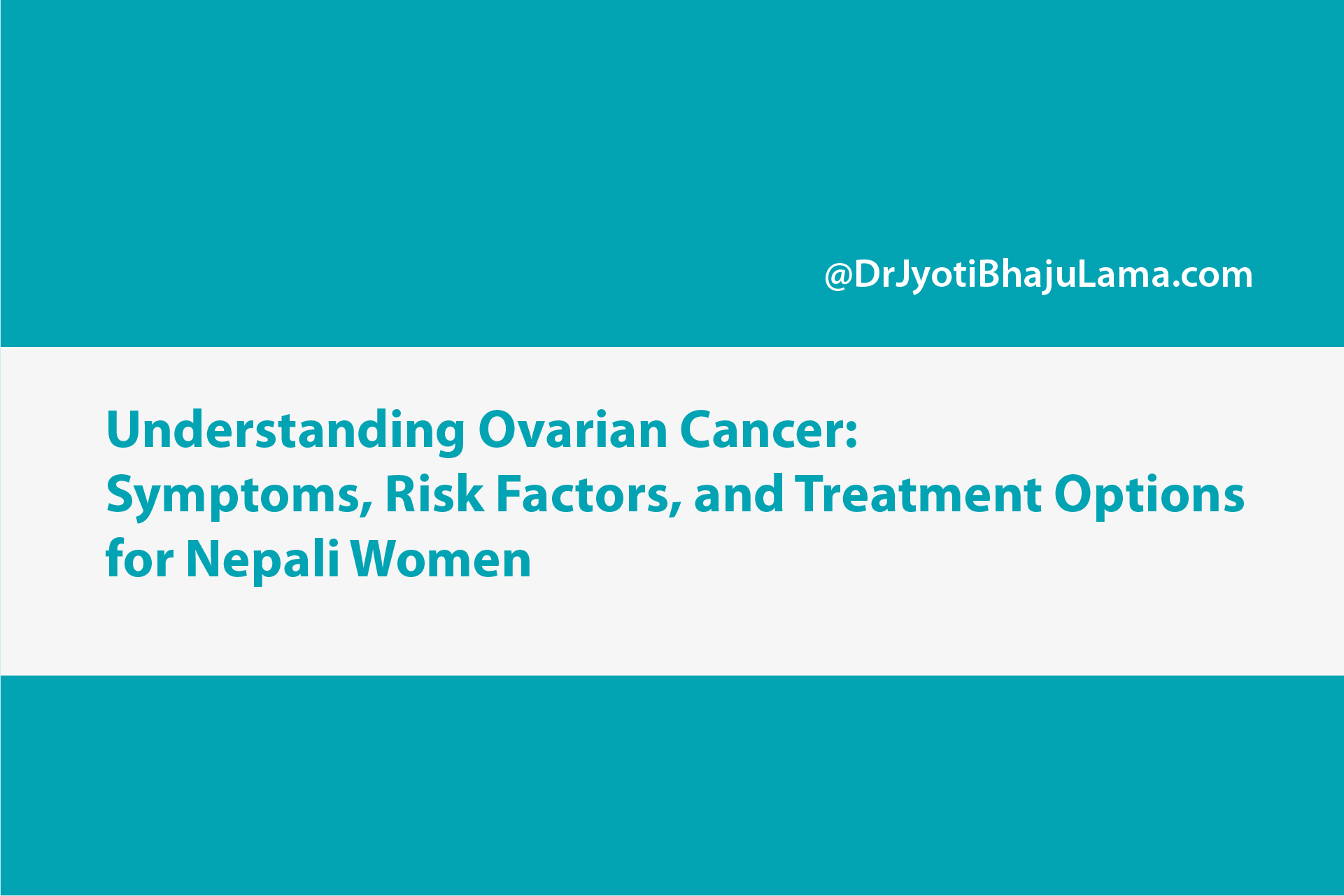Introduction
Ovarian cancer is one of the most serious health concerns for women, but it often goes undetected until it reaches an advanced stage. As one of the leading gynecological cancers, understanding its symptoms, risk factors, and available treatment options is crucial for early detection and better outcomes. Dr. Jyoti Bhaju Lama, a specialized gynecological oncologist in Nepal, helps women understand ovarian cancer and how to take proactive steps toward safeguarding their health.
What is Ovarian Cancer?
Ovarian cancer begins in the ovaries, the female reproductive organs responsible for producing eggs and hormones. It is often referred to as the “silent killer” because the symptoms are subtle and can easily be mistaken for other, less serious conditions. Early-stage ovarian cancer often has no noticeable symptoms, which makes awareness and regular check-ups even more important.
Common Symptoms of Ovarian Cancer
While ovarian cancer can be silent in its early stages, there are certain symptoms that women should watch out for. If you experience any of the following for an extended period, it’s important to consult a doctor:
- Abdominal bloating or swelling
- Pain or discomfort in the pelvic area
- Frequent urination or difficulty urinating
- Feeling full quickly while eating or loss of appetite
- Unexplained weight loss or gain
- Changes in bowel movements, such as constipation
These symptoms don’t always mean ovarian cancer, but they can indicate other health issues that should be investigated.
Risk Factors for Ovarian Cancer
Several factors can increase a woman’s risk of developing ovarian cancer. While some of these are beyond a woman’s control, understanding these risks can encourage early screenings and preventive care:
- Age: Ovarian cancer is more common in women over 50, especially those who have gone through menopause.
- Family History: A family history of ovarian or breast cancer may increase risk. If your mother, sister, or grandmother had ovarian cancer, you may be at higher risk.
- Genetics: Inherited gene mutations, such as BRCA1 and BRCA2, significantly raise the risk of ovarian cancer.
- Endometriosis: Women with endometriosis have an increased risk of developing ovarian cancer.
- Never being pregnant: Women who have never been pregnant may have a higher risk of ovarian cancer.
If you have any of these risk factors, it’s essential to talk to your doctor about early detection methods.
Treatment Options for Ovarian Cancer
If diagnosed early, ovarian cancer is treatable with surgery and chemotherapy. The treatment plan will depend on the stage and type of cancer. Here’s an overview of common treatment methods:
- Surgery: Often the first step in treatment, surgery involves the removal of the ovaries, fallopian tubes, and sometimes the uterus. This is typically done through a procedure called “debulking surgery” to remove as much of the tumor as possible.
- Chemotherapy: After surgery, chemotherapy may be used to kill remaining cancer cells. It can be administered intravenously or directly to the abdomen.
- Targeted Therapy: Newer treatments, like targeted therapies, focus on specific molecules involved in the cancer’s growth.
- Interval Debulking Surgery: For advanced ovarian cancer, a second surgery may be needed after chemotherapy to remove the remaining tumor.
Dr. Jyoti Bhaju Lama’s Expertise in Ovarian Cancer
As an experienced gynecological oncologist, Dr. Jyoti Bhaju Lama offers specialized care for women battling ovarian cancer. From initial screenings and diagnosis to surgical and post-treatment care, Dr. Lama ensures that women in Nepal receive comprehensive, compassionate, and personalized treatment options.
Early Detection Saves Lives
The key to fighting ovarian cancer lies in early detection. Regular check-ups, screenings, and awareness of your body’s signals are essential steps to reduce the risks associated with ovarian cancer. Don’t wait for symptoms to worsen—schedule a consultation with Dr. Jyoti Bhaju Lama and take control of your health today.
Raising Awareness: Overcoming Misinformation and Lack of Awareness Among Nepali Women
In Nepal, many women face a lack of awareness about ovarian cancer, often leading to delayed diagnoses and missed opportunities for early treatment. Cultural stigma, limited access to healthcare, and misinformation can make it difficult for women to openly discuss symptoms or seek help. Many women remain unaware of the importance of regular screenings, such as pap smears or HPV tests, which could detect early signs of ovarian cancer. This gap in awareness and knowledge not only increases the risk of late-stage diagnoses but also fosters misconceptions about the disease, making it essential for healthcare providers like Dr. Jyoti Bhaju Lama to educate and empower Nepali women to take charge of their health and seek timely care.
Conclusion
Ovarian cancer may be difficult to detect in its early stages, but with the right knowledge and proactive care, women can safeguard their health. Understanding the symptoms, knowing your risk factors, and seeking timely treatment are essential steps to prevent and manage ovarian cancer. If you or a loved one are concerned about ovarian cancer, contact Dr. Jyoti Bhaju Lama for expert care and support. Your health matters, and early action can make all the difference.


